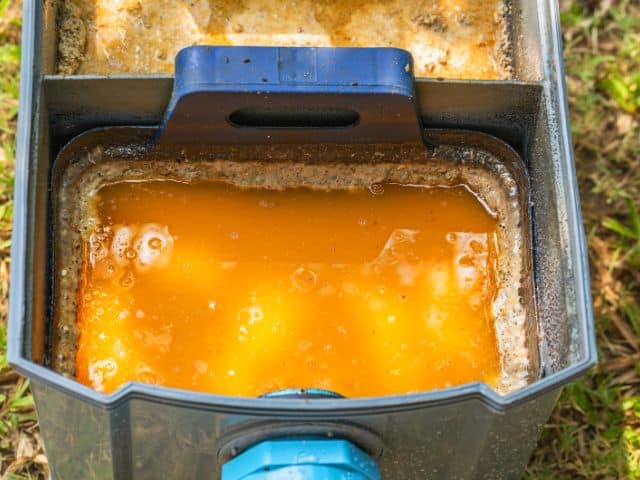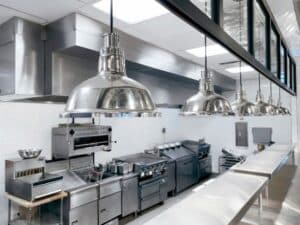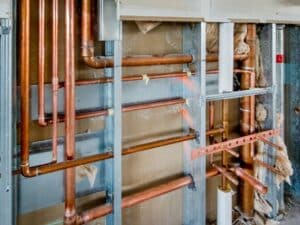If you own or operate a restaurant, you’ve probably heard about the importance of grease traps. While often overlooked, grease traps are essential components in maintaining a functional, compliant, and environmentally friendly kitchen. In this blog, we’ll explain what grease traps are, why they’re critical for restaurants, and how proper maintenance can save you from costly repairs and fines.
What is a Grease Trap?
A grease trap, also known as a grease interceptor, is a device installed in the plumbing system of commercial kitchens to capture fats, oils, and grease (commonly referred to as FOG) from wastewater before it enters the main sewer system. In a busy restaurant, a large amount of FOG can be produced through daily activities like cooking, washing dishes, and cleaning kitchen equipment. If not properly managed, this grease can build up in pipes, leading to blockages, sewer backups, and potentially expensive repairs.
Grease traps are designed to allow water to flow through while trapping the heavier FOG, which rises to the top and is stored in the trap. The grease is then regularly removed and disposed of according to local regulations.
Why Grease Traps are Crucial for Restaurants
- Prevent Clogged Pipes and Sewer Backups
Grease and oils can solidify as they cool down, creating blockages in plumbing systems. Over time, these blockages can lead to severe plumbing issues like slow drainage, unpleasant odors, and even sewer backups. A properly functioning grease trap catches FOG before it enters the pipes, preventing costly repairs and health hazards. - Environmental Responsibility Grease can cause significant damage to local water systems if it enters the sewer. It can lead to clogged sewer lines, and eventually overflow into nearby water sources, contributing to pollution. By using a grease trap, restaurants play a critical role in protecting the environment and keeping local ecosystems healthy.
- Compliance with Local Regulations In most areas, grease traps are not only recommended—they are mandatory. Health departments and local regulatory bodies often require restaurants to install and maintain grease traps to comply with wastewater regulations. Failure to meet these standards can result in fines, penalties, or even temporary closure of the business.
- Prevents Disruptions in Operations If a restaurant’s plumbing gets blocked due to grease buildup, it can lead to downtime, loss of business, and negative customer experiences. A regularly maintained grease trap ensures that your operations run smoothly without interruptions due to plumbing problems.
How Grease Traps Work
Grease traps are simple yet effective in their design. When wastewater from sinks, dishwashers, and other kitchen appliances flows into the grease trap, it enters a tank where the water slows down. This slowdown allows the grease, fats, and oils to float to the top, while food solids settle at the bottom. The remaining liquid, now free of FOG, is then safely discharged into the main sewage system. Over time, the trapped grease and food waste accumulate and must be professionally removed to keep the trap functioning effectively.
Grease Trap Maintenance: What You Should Know
Proper maintenance of a grease trap is essential to keep your kitchen running smoothly. Here are some tips on how to maintain your grease trap:
- Regular Cleaning Depending on the size of your grease trap and the volume of FOG your kitchen produces, cleaning the trap should happen regularly. Most health departments recommend cleaning every 1-3 months, but high-volume restaurants may need more frequent cleanings. Failing to clean the grease trap can result in grease spilling over into the sewer system or causing backups in your kitchen.
- Professional Servicing While some smaller grease traps can be cleaned in-house, it’s usually best to hire a professional grease trap cleaning service. They have the proper tools, expertise, and disposal methods to ensure the job is done right, and they’ll often keep records of cleaning to ensure you’re in compliance with local regulations.
- Inspection and Repair Over time, grease traps can suffer from wear and tear, leading to cracks, leaks, or other malfunctions. Regular inspections can help identify these issues before they become major problems. If your grease trap is damaged, it’s essential to repair or replace it immediately to prevent disruptions in service and regulatory violations.
- Avoiding Harmful Substances To keep your grease trap in top shape, avoid pouring harmful substances down the drain, such as harsh chemicals, which can damage the trap or reduce its effectiveness. Encourage staff to scrape off food waste before washing dishes and use strainers to catch solids that can clog pipes and overwhelm the grease trap.
Types of Grease Traps
There are two main types of grease traps used in restaurants:
- Passive Grease Traps
These are smaller grease traps typically located indoors, under the sink or within the kitchen. They are often used in smaller restaurants or in locations where space is limited. Passive traps require frequent cleaning because they have less capacity. - Automatic Grease Removal Units (AGRU)
These are more advanced and often larger systems that automatically separate and remove grease from wastewater. They are typically used in high-volume kitchens and offer more convenience and efficiency in terms of maintenance, although they can be more expensive to install.
Conclusion
Grease traps are an indispensable part of any restaurant’s kitchen infrastructure. They help prevent costly plumbing issues, ensure compliance with local regulations, and protect the environment. At the same time, they require proper maintenance and regular cleaning to remain effective. Whether you’re running a small café or a large restaurant, investing in a high-quality grease trap and keeping it well-maintained is one of the best decisions you can make to ensure the smooth operation of your kitchen.
If you need help selecting, installing, or maintaining a grease trap for your restaurant, don’t hesitate to reach out to us. Our team of experts is here to provide professional advice and services to keep your kitchen running efficiently and your business compliant with all regulations.





